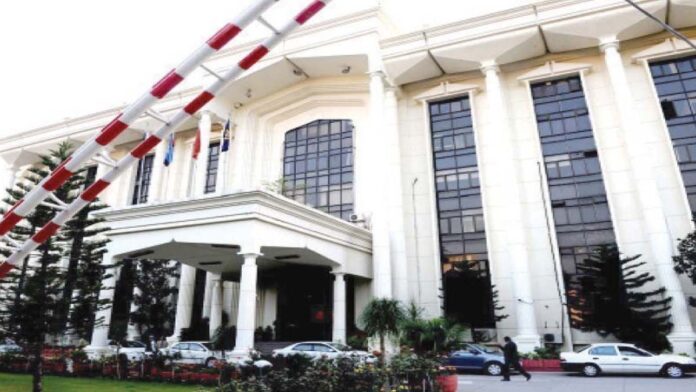ISLAMABAD:
The government has quietly withdrawn the 17% sales tax that it had imposed last month through the mini-budget on imports by foreign diplomatic missions and the United Nations agencies after a warning from the Foreign Office (FO) that other countries may take Pakistan to the International Court of Justice over the move.
The Federal Board of Revenue (FBR) apparently made an illegal move by withdrawing the tax through simple “instructions” instead of getting the Sales Tax Act of 1990 amended by the National Assembly.
Through the February 4 instructions, the government also withdrew the 17% sales tax imposed last month on the imports made by the President of Pakistan, Prime Minister of Pakistan and provincial governors. Where the FBR has withdrawn the sales tax on the country’s top rulers, it has maintained it on bread and other edible goods sold in bakeries and at restaurants.
“On the request made by the Ministry of Foreign Affairs, the issue of tax exemption on imports by diplomats, diplomatic missions and other privileged persons has been reviewed and consequently sales tax shall not be collected on such imports covered under PCT headings 99.01, 99.02 and 99.06 of Chapter 99 of the First Schedule to the Customs Act, 1969,” according to the instructions that the FBR issued last week on Friday.
These instructions have been forwarded to all the customs offices in Pakistan for implementation.
Read Also : Pakistan’s Tazah closes 6.5$ million pre-seed for B2B
The customs tariff heading 99.01 covers goods imported by various agencies of the United Nations under the United Nations Privileges and Immunities Act, 1948 and the heading 99.02 is about goods imported by diplomats, embassies, consulates under the Diplomatic and Consular Privileges Act, 1972.
As part of the Rs360 billion mini-budget, the government had imposed 17% GST on goods imported by various agencies of the United Nations, diplomats and the diplomatic missions.
Through the same mini-budget, the government imposed taxes on bread, bakery items, children’s milk, raw materials of medicines and all types of imported machinery while also increasing taxes on cellular calls.
But the tax can only be withdrawn either through a Presidential Ordinance or by an act of parliament and the move to withdraw the levy is legally not attainable, according to independent tax experts.
Despite repeated attempts, the FBR spokesperson did not reply to the questions whether tax could be withdrawn through a clarification or an administrative order. He also did not respond to the question whether the board was above parliament and the Constitution that it could overrule an act of parliament through simple instructions.
The FBR has also withdrawn the 17% GST imposed last month on goods imported under the President’s Salary, Allowances and Privileges Act, 1975, goods imported under the Prime Minister’s Salary, Allowances and Privileges Order,1975, goods imported under the Governor’s Salary, Allowances and Privileges, Order,1975 and goods imported under the Acting Governor’s (Allowance and Privileges) Order,1978.
Similarly, furniture, and spare parts in respect of official cars, river craft or air craft imported or purchased out of bond for the president, prime minister, governor or acting governor has also been exempted from the 17% GST, according to the FBR documents.
Sources said that it was an unwise move by the FBR to slap 17% tax on imports by foreign diplomats, diplomatic missions and the UN agencies.
The sources said that the FO told the FBR that its decision to withdraw tax immunity available to the foreign missions and their diplomats was in violation of the Vienna Convention on Diplomatic Relations of 1961 and 1972.
The FBR spokesperson also did not reply to the questions whether it was the inefficiency on part of the FBR that it didn’t carefully assess the impact of imposition of GST on diplomats who were protected under the Vienna Convention?
In a correspondence, the Ministry of Foreign Affairs intimated the FBR that legally the diplomatic missions and the United States may invoke jurisdiction of the International Court of Justice, the sources said. The FO also warned that the other countries could also take similar retaliatory measures against Pakistan, they added.
To a question whether it was correct that on February 1, 2022, the FO informed the FBR that the UN agencies and diplomatic missions may invoke jurisdiction of the International Court of Justice if Pakistan did not withdraw 17% GST on imports by diplomats and foreign missions, the FO spokesperson Asim Iftikhar said, “What I know is that the matter has since been addressed and swiftly resolved.”
It is not the only move that the FBR has made during the last few months without thoroughly reviewing the implications.
One of the reasons for such moves that this time put Pakistan’s relations with other countries at stake is that the FBR’s affairs are now handled by relatively inexperienced and junior officers. The FBR spokesperson did not reply about its carelessness that caused international embarrassment for Pakistan when foreign missions threatened to take Pakistan to the International Court of Justice over the imposition of tax.
He also did not answer the question about handing over such serious policy matters to inexperienced officers.

